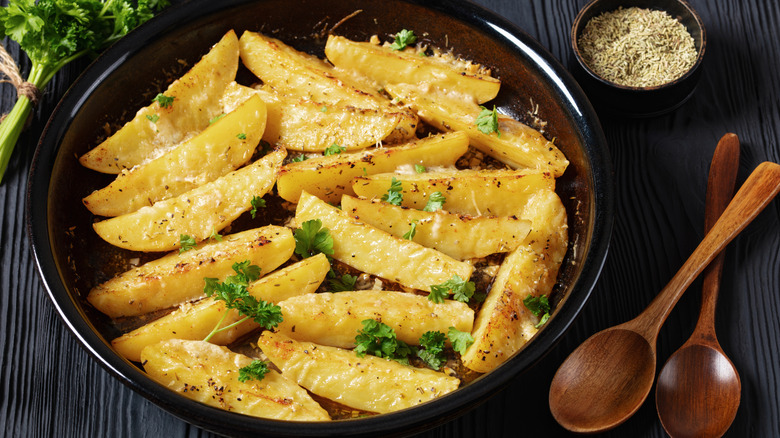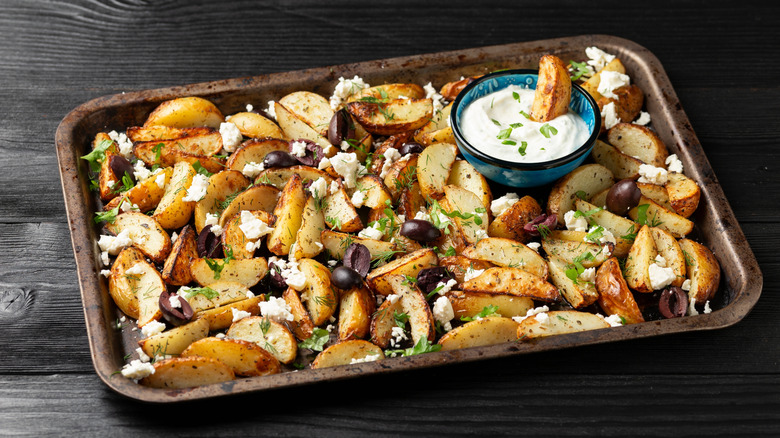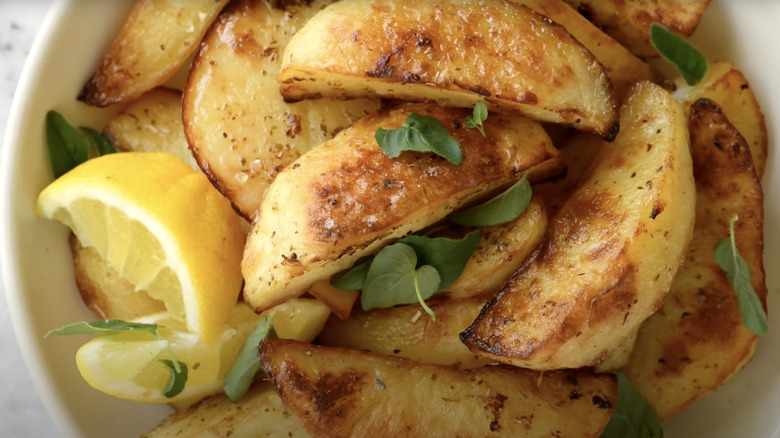For The Crispiest Roasted Potatoes, Cook Them Like The Greeks Do
When it comes to food, the Greeks do a lotta things right, from breakfast staples like Greek yogurt — not to be confused with regular yogurt — to the iconic Greek salad, and smoky grill favorites like souvlaki and gyros. Another dish they seem to have mastered is their perfectly roasted potatoes, a common side for grilled meats, or even enjoyed on their own with a homemade tzatziki. To find out how the Greeks roast their potatoes to crispy perfection, Food Republic consulted Olivia Roszkowski, chef-instructor of Health-Centered Culinary Arts at the Institute of Culinary Education's New York City campus.
"Greek roasted potatoes are most commonly distinguished by the amount of liquid they use to first essentially braise the potatoes in the beginning stages of cooking," Roszkowski told us. This method is unique, as it oven-roasts the potatoes in a lemony-herby broth, creating a half-braised, half-roasted texture that arises when the spuds soak up the aromatic flavors. The typical method of dry-roasting potatoes with oil and seasonings, on the other hand, steams the inside but seals the surface, preventing the potatoes from drawing in any additional savory notes. "Once the liquid is absorbed, the potatoes will start to roast with the help of olive oil," Roszkowski explained. "The result is a fluffy interior and a crispy exterior."
Greek-style potatoes get flavor from lemon and herbs
When making these potatoes, the broth typically consists of several core ingredients integral to Greek cooking, including olive oil, lemon juice, and herbs like oregano, thyme, and rosemary. Combined, these ingredients give the potatoes a distinctive Greek-style character — and once the liquid is evaporated and absorbed, the potatoes continue to cook in the olive oil, allowing them to achieve their crispy, golden-brown hue. Olive oil is also known for its rich, fruity flavor, so investing in a high-quality product will boost the overall flavor profile of your potatoes.
"Lemon juice adds a brightness to liven up the natural, earthy notes of the tuber," Olivia Roszkowski added. The fresh acidity of the lemon juice is essential — once it is absorbed into the potatoes' interior, it infuses them with a citrusy flavor that rounds off the whole dish. Another flavor enhancer is oregano, and when it's roasted "the essential oils of the herb bloom and interact with the olive oil, making the finished product fragrant and pronounced," Roszkowski told us. If you like the smell of Greek food, chances are it's the aroma of roasted oregano perfuming the air.
Proper technique ensures the crispiest roasted potatoes
According to Olivia Roszkowski, cooking your Greek-style roasted potatoes at 375 to 400 degrees Fahrenheit is the sweet spot. Too high, and the braising liquid evaporates before it soaks into the potatoes and infuses them with flavor. Too low, and the potatoes cook through without crisping — and let's face it, the crispiness is the best part. "The potatoes need a hot oven to cook properly. Place them on the center oven rack," Roszkowski added. The center rack is a no-brainer here because it enables the most even heat circulation.
"Use a shallow pan so the potatoes can be arranged in a thin layer of flavorful liquid," Roszkowski told us, adding that too much liquid "can inhibit browning and lead to soggy potatoes." We recommend half-covering the potatoes with the lemon-herb broth for a strong braise. You should also ensure the potatoes are evenly spread out and not overcrowded in the pan, which will allow them to cook and soak up the liquid evenly. While you should make sure to turn them occasionally, "do not continuously open the oven in the beginning stages of cooking, as this will cause hot air to escape," Roszkowski advised. For an extra crispy roast potato you need high, consistent heat, so losing hot air will inhibit crisping and extend the cooking time.



